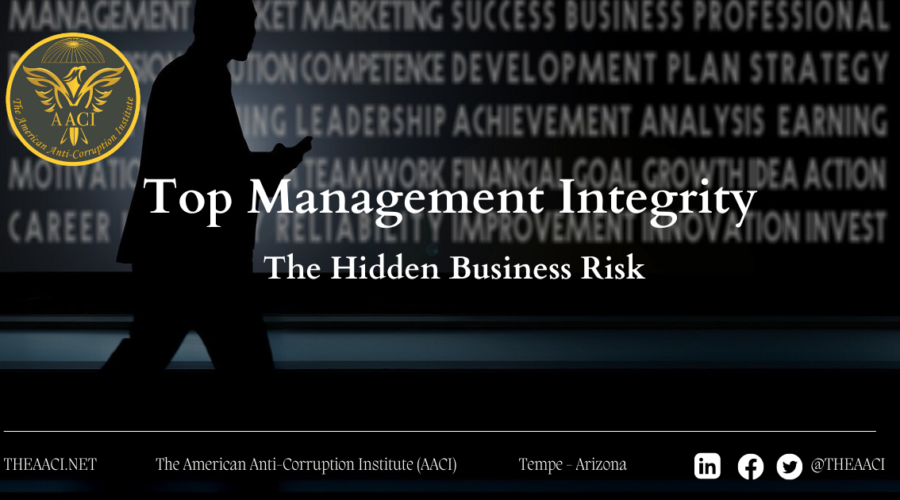Technical Staff;
October 15, 2024
Takeaways
1. The integrity of top management is directly linked to corruption and fraud risks, which are significant business risks.
2. Stakeholders must actively monitor management’s ethical commitment and follow company news to ensure transparency and accountability.
3. Red flags, such as a lack of transparency, frequent leadership changes, and unexplained financial performance, signal potential integrity issues.
4. Shareholders and governance bodies should enforce best practices, including ethical leadership, independent audits, and whistleblower protection.
5. Never employ or retain individuals in leadership positions whose integrity is in question.
In any business, the integrity of top management is pivotal. It forms the cornerstone upon which ethical values, company culture, long-term performance, growth, and sustainability rest. When management lacks a strong commitment to integrity, the business exposes itself to a series of risks, including corruption and fraud. These risks are not just moral failings but are also substantial business risks that can undermine the organization’s viability, reputation, and profitability—whether it is a for-profit, nonprofit, or listed company.
The Link Between Integrity and Corruption Risks
Top management’s commitment to integrity serves as the foundation for an ethical corporate culture. When integrity is compromised, it opens the door to fraud, embezzlement, and corrupt practices. The absence of ethical leadership erodes trust within the organization, encouraging lower-level employees to engage in unethical behaviors. Corruption or fraud is not just an ethical issue—it is a tangible business risk that threatens operational efficiency, financial stability, and stakeholder confidence.
An organization that fails to address corruption risks or allows ethical standards to falter may face lawsuits, regulatory penalties, and reputation damage that can lead to substantial financial losses. Stakeholders should be highly concerned if management integrity is in question, as this undermines the very foundation of sustainable success.
The Role of Stakeholders in Monitoring Integrity
Stakeholders—whether shareholders, investors, or those charged with governance—have an active role in ensuring that top management upholds integrity. In today’s volatile business environment, they should not sit passively. Instead, they must:
1. Follow Company News
Stakeholders should remain vigilant about corporate developments, paying close attention to any news related to top management’s ethical conduct.
2. Request Information
Stakeholders must request detailed operational results and performance updates from the company. They must ensure that financial transparency and accountability are prioritized.
3. Monitor Governance
A healthy corporate governance framework should allow stakeholders to raise concerns and demand corrective action when integrity is at stake.
Red Flags Signaling Integrity Risks
Stakeholders must stay alert to warning signs that indicate the potential deterioration of management integrity. Some key red flags include:
a. Lack of Transparency
Inconsistent reporting or limited access to financial data should raise concerns.
b. Frequent Leadership Changes:
A revolving door at the executive level might indicate instability and ethical concerns.
c. Unexplained Financial Performance:
When business results are surprisingly strong, with no clear explanation for success, it could signal manipulative or fraudulent practices.
d. Poor Tone at the Top:
A culture of blame-shifting, secrecy, and disregard for ethical practices is a major red flag.
e. Avoidance of Independent Oversight:
When management resists the establishment of external audits or governance reviews, it might be hiding deeper ethical issues.
f. Conflict of Interest
Unaddressed conflicts of interest between management and business dealings can suggest unethical motives.
Recommendations to Enhance Integrity and Ethical Commitment
Given the high stakes, shareholders and those responsible for governance must take proactive steps to foster an ethical and corruption-free environment. Below are essential recommendations to help management stay aligned with best practices:
1. Do Not Hire Without Trust
Do not employ individuals if you are not entirely comfortable with their integrity. Ethical conduct should be a non-negotiable trait in leadership.
2. Enforce Accountability
Continuously monitor the integrity of top management and its adherence to ethical values. Do not hesitate to remove any manager whose integrity is in doubt.
3. Establish Clear Ethical Standards
Develop and implement robust codes of ethics and conduct, ensuring these are not just theoretical but are actively enforced.
4. Design, implement, and independently audit a corruption prevention policy
Establish and implement a corruption prevention policy that aims to lower corruption risks to acceptable low levels. Make sure that an independent third party audits the effectiveness of the policy.
5. Encourage Whistleblowing
Create and support channels for employees and stakeholders to report unethical behavior without fear of retaliation. Whistleblowing is an integral part of the corruption prevention policy.
6. Prioritize Ethical Leadership Development
Invest in leadership development programs that emphasize the importance of integrity and ethical behavior.
7. Hold Regular Governance Reviews
Ensure that corporate governance structures are reviewed regularly to assess their effectiveness in promoting accountability and ethical practices.
Conclusion
A leadership team deeply committed to integrity is at the heart of any sustainable business. Ethical values cannot be optional or secondary; they must be ingrained in the leadership’s decision-making process and day-to-day actions. Stakeholders, particularly those responsible for governance, must remain vigilant, ensuring that top management adheres to these values. Ignoring ethical red flags will inevitably result in financial losses, damaged reputations, and business failure.
Image by Gerd Altmann from Pixabay











































